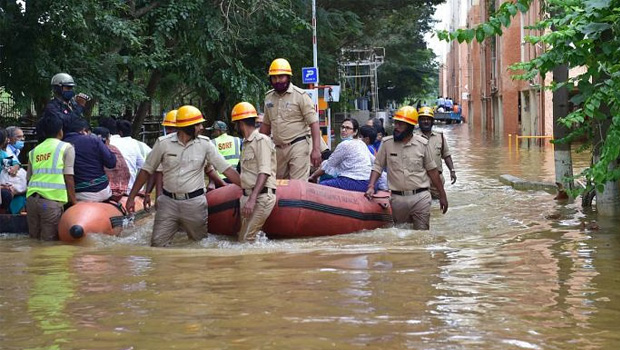
Bengaluru water emergency : Isn't this a mock drill of a dry future ?
Exactly four years ago today, when the Corona lockdown was announced, we saw some strict and strange restrictions, even If a person was seen without a mask, a fine of some thousands of rupees was imposed, or if more than four people got together in public a penalty would be levied, or if people are seen in public places after four o'clock in the evening, they will be arrested by the police! However, we defined those days of Corona as a global pandemic. A global pandemic has its own rules and rules that must be obeyed even if they are a little odd. But now the pandemic is over. And the whole world has got rid of what could be called strange rules and restrictions. But Bengaluru has become the only city in the world where extreme odd rules have been enforced even if there is no epidemic. And the reason for applying those rules is the manmade water crisis of Bengaluru!
Yes, Bengaluru has become the only city in the world where a fine of five thousand rupees has been announced by the municipality for washing vehicles or even for gardening! That's right, the government has started controlling private borewells. Currently, even the use of water has been banned at construction sites as well. Water scarcity in Bengaluru has gone to such an extent that the government has also asked the owners of water tankers to register and if unregistered water tankers are caught distributing water in the city, apart from confiscation of the tanker, provision has been made for imprisonment for the owner of the tanker! Also, currently, it is still early summer only... and the wait until the June the onset of monsoon is still long. It is not possible to imagine what the situation will be in Bengaluru by then!
However, the question here is that in a city where it rains half a day in the evening or in a state where the monsoon is proportional, how can such a shortage of water be created in the city? Finally, what are the reasons that on the one hand, heavy rainfall occurred in Bengaluru in the month of November itself and within a few months there was a shortage of water in this important city of the country? The biggest reason is dependency on ground water and neglect of ground water recharge. Yes, most of our cities are now filled with paver blocks as well as concrete, and Bengaluru is one of them! Due to which heavy rainfall or even normal rains flood the cities and then all the water flows into the storm water drains and gets wasted. But the urban ground water is not recharged.
On the other hand, I studied some reports and realized that most of the water management of households and municipalities in Bengaluru depends on ground water! That is, neither the Bengaluru Municipality nor the Government of Karnataka has any interest in recharging the lakes or maintaining the lakes. Bengaluru would not have faced the crisis it is witnessing today if the city lakes or lakes around the city would have been properly maintained and their water utilized! In my research, I have even read that there has been illegal construction on the natural sources of water in the Bengaluru city area in the past years. Places that were once sources of water and trees are now concrete jungles!
Also, along with all these discussions, on the other hand, the problem of major climate change is still standing! However, I have to say here that the Bengaluru water crisis is more of a manmade crisis than climate change. After reading several reports, I have come to realize that Bengaluru Municipality is not serious about water conservation. Had there been proper utilization of rain water, such a crisis would not have happened. Besides, statistics say that Bengaluru usually receives 1,071.6 mm of annual rainfall. Where 1,020 mm of rain has been recorded in the year 2023. It means that there was no shortage of rain in Bengaluru. But this problem has arisen because the rulers were not concerned about water conservation.
But it is not that we can neglect our responsibilities by considering this problem of Bengaluru as a manmade problem only. Bengaluru's water crisis is a red alert for all of us that we have to make our urban planning environment-centric. Cities may be expanding, but the development of the cities will not last if they are encroaching on nature. In the year 2024 and the era of climate change, we have to understand that development is not about infrastructure development only! Development has a direct relationship with nature, water, and biodiversity without which humans will not be able to sustain and survive. Rainwater harvesting, urban forestry, and biodiversity have to be given special attention in urban planning. Otherwise, it is just a good luck that the rains in Bengaluru this year have been proportional... What if there is a drought or prolonged scarcity of rainfall for two or three years in a row?
Because we have come to a mode of climate change where we never know how nature is going to treat us. In such a case, if we do not make any change in our lifestyle or in our urban planning, then we will end up fighting for even a single drop of water. Finally, it is very sad that on the one hand, we are dreaming of creating a colony on Mars, and on the other hand, Earth is struggling for water.